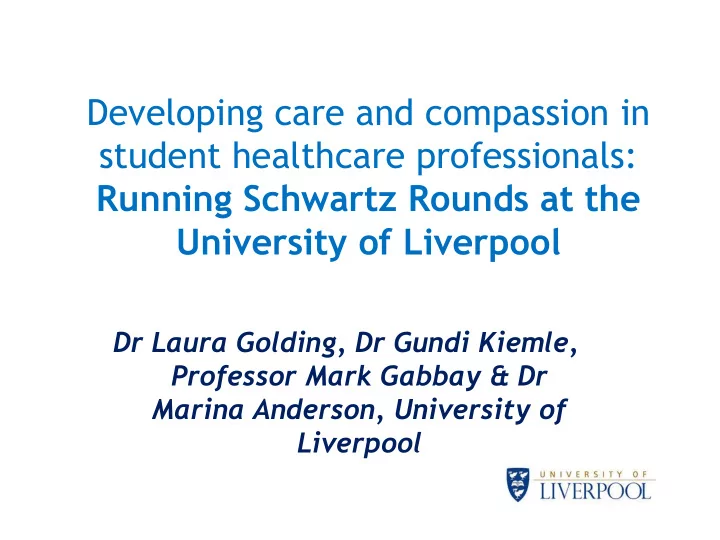

Developing care and compassion in student healthcare professionals: Running Schwartz Rounds at the University of Liverpool Dr Laura Golding, Dr Gundi Kiemle, Professor Mark Gabbay & Dr Marina Anderson, University of Liverpool
University of Liverpool Schwartz Round Project • Funded by Health Education England(North West) Forerunner Fund. • Aims to run and evaluate the impact of Schwartz Rounds for students on pre-qual./pre-reg. professional healthcare education programmes. • The project is multi-professional, involving students from a range of different professional healthcare education programmes. • Three University staff are trained as Schwartz Round facilitators. • So far, we have run four Rounds with students. • Seventeen Y2 and Y3 Research and Scholarship (R&S) MBChB linked projects (care and compassion).
University of Liverpool Schwartz Round Project We ran two pilot Schwartz Rounds with Y2 and Y3 medical students: • 100% either agreed or strongly agreed that they found it helpful hearing others talk openly about their personal feelings in the context of their work. • 100% either agreed or strongly agreed that they felt more informed and aware of the importance of care and compassion in caring for patients. • 72% felt that the Rounds should be integrated into their medical training curriculum.
University of Liverpool Schwartz Round Project • We also ran two Schwartz Rounds with Y3 nursing, occupational therapy, medical, diagnostic radiography, radiotherapy and physiotherapy students. • Of the 31 students who attended these two Rounds, 26 rated the Rounds as excellent or exceptional, with 20 completely agreeing that they would attend a Round again.
Participant Quotes “Fantastic! Thought this session was incredibly useful, its great to be able to talk about experience and emotions involved. Definitely think this should be in the curriculum”. “Found it insightful and encouraging in that the experiences I've had with patients are shared by many and its normal to get emotional. Great to see how these patient experiences have shaped the paths of the senior doctors presenting”.
Participant Quotes “Good to reflect on own emotions and relate to others - helps you feel like you're not alone and that it is normal to have emotions”. “I found it really useful. I think it would be good to have one every couple of months so we can reflect on patients/cases we have seen on placement who have effected us”. “Great idea - should be incorporated into the curriculum in more clinical years”.
Participant Quotes “I feel better for sharing my emotional experiences with staff who can completely understand and empathise with me and take interest”. “...it is important for people to discuss these things – a way of maintaining empathy at work by acknowledging there isn’t always a right answer and that the work is about more than robotically following guidelines”. “Makes you realise you’re not on your own in how you’re feeling”
Challenges • Providing Schwartz Rounds for students on pre-registration professional healthcare education programmes at the university – in contrast to Rounds for clinical staff in NHS or other healthcare settings – has a number of challenges. • Students’ clinical exposure is more limited, especially medical students in Years 2 and 3, and therefore, they have less clinical experience to draw on for reflections. • Students are used to being evaluated and assessed at all times, which (for some) may inhibit the open and honest sharing of feelings and reflections, as it may feel as though they are ‘exposing weaknesses’ which goes counter to their clinical and academic training.
Challenges • Running Rounds in a university setting may feel like another type of ‘teaching’, with both panellists and students (un)consciously looking to provide and gain ‘take - home messages’, tips, and learning points. This requires additional skills and attention for panel preparation and audience facilitation. • Mandatory versus voluntary attendance: If Rounds are not mandatory, the challenge of persuading students to attend another educational event in their own time, should not be underestimated! • Time-tabling : Healthcare students’ timetables are fairly full, with timetables set for the academic year ahead. When students are not in university, they are usually on clinical placements in the community. This presents logistical challenges for running multi- professional Rounds.
Research & Evaluation • We are developing the evaluation of the Rounds and elements of the format in collaboration with the initial cohort of students who attended the Rounds. This co-production and active reflection has helped shape the initial phases of the pilot and underpins the approach of the evaluation. • Y2 & Y3 medical students have undertaken a series of structured literature reviews about key theories linked to the focus of Schwartz Rounds such as: Burnout, Communication models (Neighbour), Balint Groups, Compassionate Mind, Organisational Culture, Developing Learning Organisations, Intelligent Kindness. • Others undertook structured reviews of the existing literature on the impact of Schwartz Rounds, and their evaluation.
Research & Evaluation • These literature reviews are on areas of theory chosen by students as relevant to the process and impact of Schwartz Rounds. The planned in-depth evaluation they will be working on will be in collaboration with, and under the supervision of, academics on the steering board, supported by an experienced qualitative researcher. • Short summaries of these projects will be included on the University’s Schwartz Round Project website which is under development and will be a resource for internal and external users. • We plan to undertake a quantitative and qualitative evaluation of the Rounds, including measures of resilience, self-reflection, self- efficacy and self-compassion. Qualitative research will include an ethnographic study on the process of the Rounds and a focus on students’ experience of attending Rounds and their perceived impact on this their clinical practice.
l.golding@liverpool.ac.uk
Recommend
More recommend